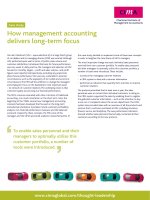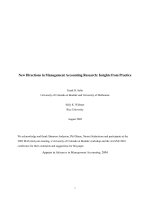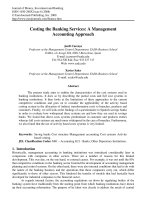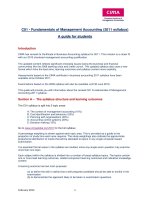BPP ACCA f2 FMA management accounting 2017
Bạn đang xem bản rút gọn của tài liệu. Xem và tải ngay bản đầy đủ của tài liệu tại đây (9.1 MB, 674 trang )
ACCA APPROVED
BPP Learning Media is dedicated to supporting aspiring business professionals
with top-quality learning material as they study for demanding professional
exams, often whilst working full time. BPP Learning Media’s commitment
to student success is shown by our record of quality, innovation and market
leadership in paper-based and e-learning materials. BPP Learning Media’s study
materials are written by professionally qualified specialists who know from
personal experience the importance of top-quality materials for exam success.
In addition to ACCA examining team reviewed
material you get:
Interactive Text
• Chapter activities to test your understanding of the
topics covered
• Key terms extracted from the text and highlighted
in ‘key term’ boxes
• Exam focus points highlighting ways in which topics
might be examined
• A question and answer bank prepared by BPP
Learning Media authors
• Icons to highlight activities, key terms, PER alerts
and quick quizzes
• Regular fast forward summaries emphasising the
key points in each chapter
Management Accounting
Foundations in Accountancy FMA / ACCA Paper F2
Management Accounting
This Interactive Text for Foundations in Accountancy
FMA Management Accounting and ACCA Paper F2
Management Accounting has been comprehensively
reviewed by the ACCA examining team. This review
guarantees appropriate depth and breadth of content
and comprehensive syllabus coverage.
Foundations in Accountancy
FMA /ACCA F2
ACCA approved content provider
A-PDF Text
Replace
DEMO: Purchase from www.A-PDF.com to remove the watermark
CONTENT
PROVIDER
ACCA Approved
Interactive Text
Contact us
Feburary 2016
£25.00
For exams from 1 September
2016 to 31 August 2017
BPP House
142-144 Uxbridge Road
London W12 8AA
United Kingdom
T 0845 075 1100 (UK)
T +44 (0)20 8740 2211 (Overseas)
E
bpp.com/learningmedia
Foundations in Accountancy FMA /
ACCA Paper F2
Management Accounting
Free access
to our Exam
Success site
Look inside
For exams from 1 September 2016
to 31 August 2017
/>
FI33ST16 (RICOH).indd 1-3
02/02/2016 10:40
ACCA APPROVED CONTENT PROVIDER
As the first accredited publisher of ACCA materials, BPP Learning Media has set the benchmark for
producing exceptional study materials for students and tutors alike.
Our Study Texts, Practice & Revision Kits and i-Passes (for exams on demand) are reviewed by the ACCA
examining team and are written by our in-house authors with industry and teaching experience who
understand what is required for exam success.
EXAM SUCCESS SITE
To help maximise your chances of succeeding in your exams, we’ve put together a suite of exclusive ACCA
resources. Our Exam Success site provides you with access to a free digital version of this publication, as
well as extra resources designed to focus your efforts on exams and study methods.
To access the Exam Success site, please email with the subject line “Access to Exam
Success site - eBook”, including your order reference number and the name of the book you’ve bought (ie
ACCA F5 Study Text) for your access code. Once you have received your code, please follow the instructions
below:
To access the BPP ACCA Exam Success site for this material
please go to:
www.bpp.com/ExamSuccessSite
n Create a user account if you don’t already have one.
Make sure you reply to the confirmation email.
n Log in using your registered username and password.
Select the paper you wish to access.
n Enter the code you received when prompted. You will only
have to do this once for each paper you are studying.
/>
Foundations in
Accountancy
FMA
ACCA
Paper F2
Management Accounting
BPP Learning Media is an ACCA Approved Content Provider for the Foundations in
Accountancy qualification. This means we work closely with ACCA to ensure this
Interactive Text contains the information you need to pass your exam.
In this Interactive Text, which has been reviewed by the ACCA examination team we:
Highlight the most important elements in the syllabus and the key skills you
will need
Signpost how each chapter links to the syllabus and the study guide
Provide lots of exam focus points demonstrating what the examination will
want you to do
Emphasise key points in regular fast forward summaries
Test your knowledge of what you've studied in quick quizzes
Examine your understanding in our practice question bank
Reference all the important topics in our full index
BPP's Practice & Revision Kit also supports this paper.
FOR EXAMS FROM 1 SEPTEMBER 2016
TO 31 AUGUST 2017
/>
I
N
T
E
R
A
C
T
I
V
E
T
E
X
T
F2/FMA MANAGEMENT ACCOUNTING
First edition March 2011
Fifth edition January 2016
A note about copyright
Dear Customer
ISBN 9781 4727 4591 0
(Previous ISBN 9781 4727 3526 3)
e-ISBN 9781 4727 4632 0
What does the little © mean and why does it matter?
British Library Cataloguing-in-Publication Data
A catalogue record for this book is available from
the British Library
Published by
Your market-leading BPP books, course materials and elearning materials do not write and update themselves.
People write them on their own behalf or as employees of an
organisation that invests in this activity. Copyright law
protects their livelihoods. It does so by creating rights over
the use of the content.
Breach of copyright is a form of theft – as well as being a
criminal offence in some jurisdictions, it is potentially a
serious breach of professional ethics.
BPP Learning Media Ltd
BPP House, Aldine Place
142-144 Uxbridge Road
London W12 8AA
With current technology, things might seem a bit hazy but,
basically, without the express permission of BPP Learning
Media:
www.bpp.com/learningmedia
Printed in the United Kingdom by Ricoh UK Limited
Unit 2
Wells Place
Merstham
RH1 3LG
Your learning materials, published by BPP
Learning Media Ltd, are printed on paper
obtained from traceable sustainable sources.
All rights reserved. No part of this publication may
be reproduced, stored in a retrieval system or
transmitted in any form or by any means,
electronic, mechanical, photocopying, recording or
otherwise, without the prior written permission of
BPP Learning Media.
Photocopying our materials is a breach of copyright
Scanning, ripcasting or conversion of our digital
materials into different file formats, uploading them to
Facebook or emailing them to your friends is a breach
of copyright
You can, of course, sell your books, in the form in which you
have bought them – once you have finished with them. (Is
this fair to your fellow students? We update for a reason.)
Please note the e-products are sold on a single user licence
basis: we do not supply 'unlock' codes to people who have
bought them secondhand.
And what about outside the UK? BPP Learning Media strives
to make our materials available at prices students can afford
by local printing arrangements, pricing policies and
partnerships which are clearly listed on our website. A tiny
minority ignore this and indulge in criminal activity by
illegally photocopying our material or supporting
organisations that do. If they act illegally and unethically in
one area, can you really trust them?
We are grateful to the Association of Chartered
Certified Accountants for permission to reproduce
past examination questions. The suggested
solutions in the practice answer bank have been
prepared by BPP Learning Media Ltd.
©
BPP Learning Media Ltd
2016
ii
/>
CONTENTS
Contents
Page
Introduction
Helping you to pass ....................................................................................................................... v
Chapter features ........................................................................................................................... vi
Studying F2/FMA......................................................................................................................... vii
The Computer Based Examination ............................................................................................... xviii
Tackling Multiple Choice Questions................................................................................................xix
Part A The nature, source and purpose of management information
1
2
3
4
5
Accounting for management................................................................................................... 3
Sources of data................................................................................................................... 19
Cost classification ............................................................................................................... 37
Cost behaviour ................................................................................................................... 55
Presenting information......................................................................................................... 75
Part B Cost accounting techniques
6
7
8
9
10
11
12
13
Accounting for materials ...................................................................................................... 99
Accounting for labour ........................................................................................................ 133
Accounting for overheads................................................................................................... 155
Absorption and marginal costing......................................................................................... 185
Job, batch and service costing............................................................................................ 199
Process costing................................................................................................................. 221
Process costing, joint products and by-products ................................................................... 251
Alternative costing principles .............................................................................................. 265
Part C Budgeting
14
15
16
17
18
19
Forecasting ..................................................................................................................... 285
Budgeting ........................................................................................................................ 331
The budgetary process....................................................................................................... 359
Making budgets work ........................................................................................................ 393
Capital expenditure budgeting ............................................................................................ 409
Methods of project appraisal .............................................................................................. 417
Part D Standard costing
20
21
22
Standard costing............................................................................................................... 445
Cost variances .................................................................................................................. 455
Sales variances and operating statements ............................................................................ 481
Part E Performance measurement
23
24
Performance measurement ................................................................................................ 501
Applications of performance measurement........................................................................... 545
Practice question bank ......................................................................................................................... 573
Practice answer bank ........................................................................................................................... 599
Appendix: Mathematical tables ............................................................................................................ 625
Index ..................................................................................................................................................... 631
Review form
iii
/>
F2/FMA MANAGEMENT ACCOUNTING
iv
/>
INTRODUCTION
Helping you to pass
BPP Learning Media – Approved Content Provider
As ACCA's Approved Content Provider, BPP Learning Media gives you the opportunity to use study
materials reviewed by the ACCA examination team. By incorporating the examination team's comments
and suggestions regarding the depth and breadth of syllabus coverage, the BPP Learning Media
Interactive Text provides excellent, ACCA-approved support for your studies.
The PER alert!
To become a Certified Accounting Technician or qualify as an ACCA member, you not only have to pass
all your exams but also fulfil a practical experience requirement (PER). To help you to recognise areas
of the syllabus that you might be able to apply in the workplace to achieve different performance
objectives, we have introduced the 'PER alert' feature. You will find this feature throughout the
Interactive Text to remind you that what you are learning in order to pass your Foundations in
Accountancy and ACCA exams is equally useful to the fulfilment of the PER requirement.
Tackling studying
Studying can be a daunting prospect, particularly when you have lots of other commitments. The
different features of the Interactive Text, the purposes of which are explained fully on the Chapter
features page, will help you while studying and improve your chances of exam success.
Developing exam awareness
Our Interactive Texts are completely focused on helping you pass your exam.
Our advice on Studying F2/FMA outlines the content of the paper and the recommended approach to
studying and any brought forward knowledge you are expected to have.
Exam focus points are included within the chapters to highlight when and how specific topics might be
examined.
Using the Syllabus and Study Guide
You can find the Syllabus and Study Guide on pages ix – xvii of this Interactive Text.
Testing what you can do
Testing yourself helps you develop the skills you need to pass the exam and also confirms that you can
recall what you have learnt.
We include Questions – lots of them – both within chapters and in the Practice Question Bank, as well
as Quick Quizzes at the end of each chapter to test your knowledge of the chapter content.
v
/>
F2/FMA MANAGEMENT ACCOUNTING
Chapter features
Each chapter contains a number of helpful features to guide you through each topic.
Topic list
Tells you what you will be studying in this chapter and the
relevant section numbers, together with the ACCA syllabus
references.
Introduction
Puts the chapter content in the context of the syllabus as a
whole.
Study Guide
Links the chapter content with ACCA guidance.
Fast Forward
Summarises the content of main chapter headings,
allowing you to preview and review each section easily.
Demonstrates how to apply key knowledge and techniques.
EXAMPLE
Key Term
Definitions of important concepts that can often earn you
easy marks in exams.
Exam Focus
Point
Tells you how specific topics may be examined.
Formula
Formulae which have to be learnt.
PER Alert
This feature gives you a useful indication of syllabus areas
that closely relate to performance objectives in your
Practical Experience Requirement (PER).
Question
Gives you essential practice of techniques covered in the
chapter.
Chapter Roundup
A full list of the Fast Forwards included in the chapter,
providing an easy source of review.
Quick Quiz
A quick test of your knowledge of the main topics in the
chapter.
Practice Question Bank
Found at the back of the Interactive Text with more examstyle chapter questions. Cross referenced for easy
navigation.
vi
/>
INTRODUCTION
Studying F2/FMA
How to use this Interactive Text
Aim of this Interactive Text
To provide the knowledge and practice to help you succeed in the examination for Paper F2/FMA
Management Accounting.
To pass the examination you need a thorough understanding in all areas covered by the syllabus and
teaching guide.
Recommended approach
(a)
To pass you need to be able to answer questions on everything specified by the syllabus and
teaching guide. Read the Text very carefully and do not skip any of it.
(b)
Learning is an active process. Do all the questions as you work through the Text so you can be
sure you really understand what you have read.
(c)
After you have covered the material in the Interactive Text, work through the Practice Question
Bank, checking your answers carefully against the Practice Answer Bank.
(d)
Before you take the exam, check that you still remember the material using the following quick
revision plan.
(i)
Read through the chapter topic list at the beginning of each chapter. Are there any gaps
in your knowledge? If so, study the section again.
(ii)
Read and learn the key terms.
(iii)
Look at the exam focus points. These show the ways in which topics might be examined.
(iv)
Read the chapter roundups, which are a summary of the fast forwards in each chapter.
(v)
Do the quick quizzes again. If you know what you're doing, they shouldn't take long.
This approach is only a suggestion. You or your college may well adapt it to suit your needs.
Remember this is a practical course.
(a)
Try to relate the material to your experience in the workplace or any other work experience you
may have had.
(b)
Try to make as many links as you can to other papers at the Introductory and Intermediate levels.
For practice and revision use BPP Learning Media's Practice & Revision Kit, iPass and Passcards.
vii
/>
F2/FMA MANAGEMENT ACCOUNTING
What F2/FMA is about
The aim of this syllabus is to develop a knowledge and understanding of the principles and techniques
used in recording, analysing and reporting costs and revenues for internal management purposes. It
covers management information, cost recording, costing techniques, budgeting and performance
measurement.
Approach to examining the syllabus
Paper F2/FMA is a two-hour paper. It can be taken as a written paper or a computer based examination.
The computer based examination contains 35 objective test questions – multiple choice, number entry
and multiple response and 3 longer style multi-task questions. (See page xvi for frequently asked
questions about computer based examinations.)
The written examination is structured as follows.
Section A
35 compulsory multiple choice questions of two marks each
Section B
3 compulsory multi-task questions of ten marks each, one from each of
syllabus areas C, D and E
Number of marks
70
30
100
The balance of questions in Section A reflects the weightings in Section B, so as to preserve the overall
balance of the paper.
The June 2015 examiner's report (found on the ACCA website) advised students to:
Study the whole syllabus, because the paper will cover the full syllabus
Practise as many questions as possible
Read questions very carefully in the examination
Try to attempt the 'easy' examination questions first
Not to spend too much time on apparently 'difficult' questions
Attempt all questions in the examination (there are no negative marks for incorrect answers)
Read previous Examiner's Reports
For paper exams, present Section B answers as tidily as possible
Read Student Accountant
viii
/>
INTRODUCTION
Syllabus and Study Guide
ix
/>
F2/FMA MANAGEMENT ACCOUNTING
x
/>
INTRODUCTION
xi
/>
F2/FMA MANAGEMENT ACCOUNTING
xii
/>
INTRODUCTION
xiii
/>
F2/FMA MANAGEMENT ACCOUNTING
xiv
/>
INTRODUCTION
xv
/>
F2/FMA MANAGEMENT ACCOUNTING
xvi
/>
INTRODUCTION
xvii
/>
F2/FMA MANAGEMENT ACCOUNTING
The Computer Based Examination
Computer based examinations (CBEs) are available for the first seven Foundations in Accountancy
papers (not papers FAU, FTX or FFM) and ACCA papers F1, F2 and F3, in addition to the conventional
paper based examination.
Computer based examinations must be taken at an ACCA CBE Licensed Centre.
How does CBE work?
Questions are displayed on a monitor.
Candidates enter their answer directly onto the computer.
Candidates have two hours to complete the examination.
When the candidate has completed their examination, the final percentage score is calculated
and displayed on screen.
Candidates are provided with a Provisional Result Notification showing their results before leaving
the examination room.
The CBE Licensed Centre uploads the results to the ACCA (as proof of the candidate's
performance) within 72 hours.
Candidates can check their exam status on the ACCA website by logging into myACCA.
Benefits
Flexibility as a CBE can be sat at any time
Resits can also be taken at any time and there is no restriction on the number of times a
candidate can sit a CBE
Instant feedback as the computer displays the results at the end of the CBE
Results are notified to ACCA within 72 hours
CBE question types
Multiple choice – choose one answer from four options
Multiple response – select more than one response by clicking the appropriate tick boxes
Multiple response matching – select a response to a number of related statements by choosing
one option from a number of drop down menus
Number entry – key in a numerical response to a question
Multiple task questions – a series of short questions related to one scenario. Question formats
could include number entry, drop-down lists, multiple choice, multiple response and hotspot
For more information on computer-based exams, visit the ACCA website.
www.accaglobal.com/en/student/Exams/Computer-based-exams.html
xviii
/>
INTRODUCTION
Tackling Multiple Choice Questions
MCQs are part of all Foundations in Accountancy exams and ACCA papers F1, F2 and F3.
The MCQs in your exam contain four possible answers. You have to choose the option that best
answers the question. The three incorrect options are called distracters. There is a skill in answering
MCQs quickly and correctly. By practising MCQs you can develop this skill, giving you a better chance of
passing the exam.
You may wish to follow the approach outlined below, or you may prefer to adapt it.
Step 1
Skim read all the MCQs and identify what appear to be the easier questions.
Step 2
Attempt each question – starting with the easier questions identified in Step 1. Read
the question thoroughly. You may prefer to work out the answer before looking at the
options, or you may prefer to look at the options at the beginning. Adopt the method
that works best for you.
Step 3
Read the four options and see if one matches your own answer. Be careful with
numerical questions, as the distracters are designed to match answers that incorporate
common errors. Check that your calculation is correct. Have you followed the
requirement exactly? Have you included every stage of the calculation?
Step 4
You may find that none of the options matches your answer.
Re-read the question to ensure that you understand it and are answering the
requirement
Eliminate any obviously wrong answers
Consider which of the remaining answers is the most likely to be correct and
select the option
Step 5
If you are still unsure make a note and continue to the next question.
Step 6
Revisit unanswered questions. When you come back to a question after a break you
often find you are able to answer it correctly straight away. If you are still unsure have a
guess. You are not penalised for incorrect answers, so never leave a question
unanswered!
After extensive practice and revision of MCQs, you may find that you recognise a question when you sit
the exam. Be aware that the detail and/or requirement may be different. If the question seems familiar
read the requirement and options carefully – do not assume that it is identical.
Tempting though it might be, don’t try to predict where the correct answers might fall based on any kind
of pattern you think you might perceive in this section. The distribution of the correct answers do not
follow any predictable pattern in this exam!
xix
/>
F2/FMA MANAGEMENT ACCOUNTING
xx
/>
part
The nature, source and purpose of
management information
1
/>
PART A: THE NATURE, SOURCE AND PURPOSE OF MANAGEMENT INFORMATION
2
/>
C H A P T E R
This chapter provides an introduction to Management
Accounting. We look at data and information and
introduce you to cost accounting and the differences
between financial accounting and management
accounting. We also outline the managerial processes of
planning, control and decision making. The sources of
data are covered in the next chapter. Chapters 3 and 4
provide basic information on how costs are classified and
how they behave.
Accounting for
management
SYLLABUS
REFERENCE
TOPIC LIST
1
Information
A1 (e), (f)
2
Planning, control and decision making
A1 (c), (d)
3
Financial accounting and cost and management accounting
A1 (a), (b)
4
Cost accounting information and decision making
A1 (g)
3
/>









